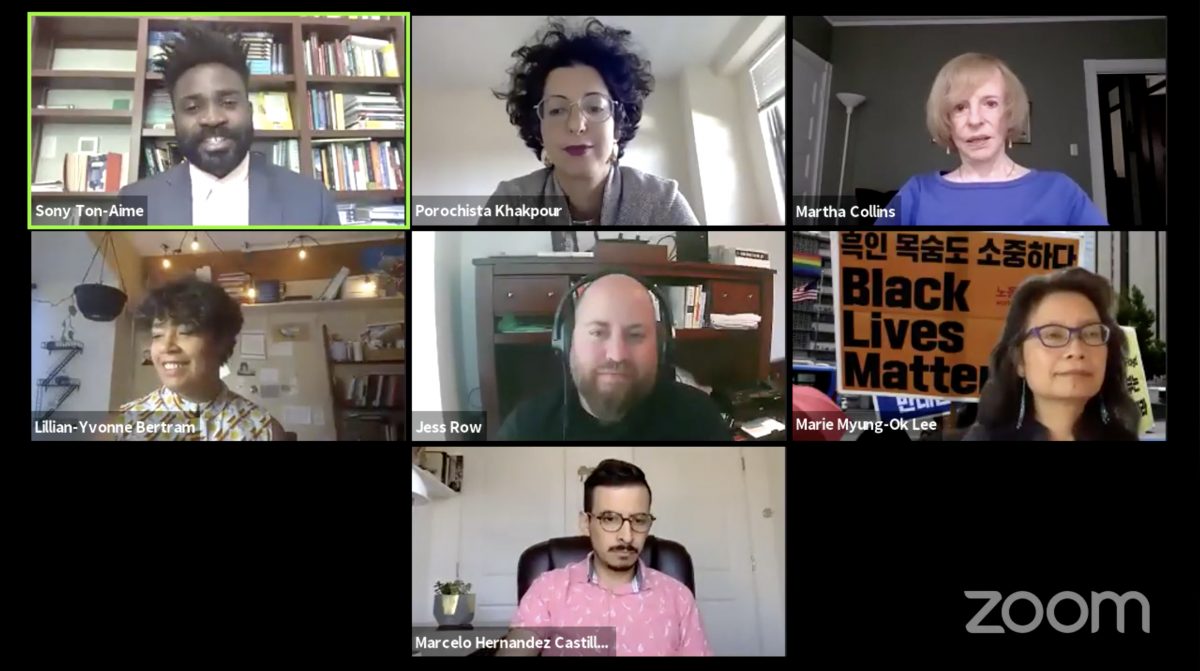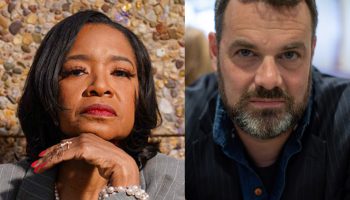The COVID-19 pandemic has indelibly changed the way literature in both the United States and the world is consumed, created and curated.
And though this year’s Chautauqua Writers’ Festival had been canceled due to the pandemic, the spirit of the festival and its commitment to literary arts was kept alive this past week by an online webinar featuring its faculty and director.
On Wednesday, June 24, a Zoom panel of the 2020 — now the 2021 — Writers’ Festival faculty convened along with Festival Director Lillian-Yvonne Bertram and Chautauqua Director of Literary Arts Sony Ton-Aime to discuss “Here in the After: Writing Toward (More) Uncertain Futures.” This conversation was part of the festival’s theme for both 2020 and 2021, “Personal Geographies.”
“The festival, its faculty and its ethos is committed to the urgent connections — even more urgent now than ever before — between the political, the personal and the writing,” Bertram said at the beginning of the discussion. “We don’t see those connections as inseparable.”
The panel consisted of Bertram and the authors Marcelo Hernandez Castillo, Martha Collins, Porochista Khakpour, Jess Row and Marie Myung-Ok Lee.
Though the panel was originally planned to solely focus on the pandemic and its effects, from the very beginning of the webinar, Bertram, author of Travesty Generator, said that the “new urgencies” of social unrest and systemic racism would form the basis for panel discussion.
After each faculty member was given a chance to read excerpts from their work, Bertram prompted the group of writers with a question on the common thread they saw as linking all of their work: inheritance.
“What are some of the lessons or inheritances that are linked to this moment for you as writers, and how do — or how must — our writing practices change in response to this?” Bertram asked the panel.
Poet Collins, author of Because What Else Could I Do, went first, referencing her experience of discovering that a story her grandfather had told her about witnessing a hanging in early 20th century Illinois was, in actuality, not a hanging at all. It was a lynching.
“I think it’s important for everyone to inherit the past that they have, and I think white people particularly are disinclined to do that because we don’t think too much about it,” said Collins.
But for Lee, author of the forthcoming novel The Evening Hero, part of her inheritance is the upheaval that went on in the country her parents came from.
“Upheaval is just life,” she said. “And here, it’s been one of those things where people seem amazed that something is happening.”
From there, Bertram shifted the discussion to whether or not it was possible for creative writing classrooms to be the sites of antiracist instruction.
“It’s very difficult for me to envision writing in a vacuum, as well as teaching in a vacuum,” said Hernandez Castillo, an immigration advocate and author of the memoir Children of the Land, “as if I am not in front of the class, not gendered, not raced, not received by my students with all the identities that I have. It’s difficult to see that that doesn’t play a factor in what I teach, how I teach, and how what I teach is received.”
Khakpour — a novelist, memoirist and literary criticism columnist for The Virginia Quarterly Review — concurred, and said that “I have been on so many faculties at so many liberal arts colleges where I am the only person of color.”
“We always provide these colleges with antiracist syllabi,” she said. “I now just think that the ignorance is absolutely willful. If you’re a white professor who doesn’t have a diverse syllabus, you’re not ignorant, you’re willfully ignorant. I will absolutely not accept it, I will absolutely not dialogue with you, and it is actually my duty to help get you fired.”
And yet, according to Row, there’s still the possibility for hope.
“The conversation in the world of creative writing has changed dramatically in the last few decades,” said Row, author of the novel Your Face in Mine. “It’s no longer uncommon to hear people talk about antiracist creative writing pedagogy. That doesn’t mean there isn’t a lot of resistance and pushback, but I’m hoping that the next step is for structures and institutions to change.”
The panel represents the first literary arts event of the 2020 season, a season which will be almost entirely online at the Virtual Porch and CHQ Assembly.
“We’re moving almost all of our programs online,” said Ton-Aime, Chautauqua’s director of literary arts and author of the poetry chapbook LaWomann. “They can be accessed through the CHQ Assembly app and through the Virtual Porch. One of our big programs is the Chautauqua Literary and Scientific Circle presentations, which happen every Thursday.”
The vertical theme for the 2020 CLSC season theme is “This Land,” and Ton-Aime said that “each book chosen as a CLSC selection in 2020 — fiction, poetry, memoir, history, biography, science — will explore ‘this land’ and other lands.”
Ton-Aime, who began his position at the Institution in January, said that while the pandemic has changed the way programming will be done this summer, “we’re going to be reaching towards people through computers and through screens.”
“We know how important it is for us to effectively manage the attention of our audiences,” Ton-Aime said. “So, we’ve changed the CLSC presentations to be 15-minute presentations by the author, and then I will join the author in conversation.”
In addition to the CLSC presentations, Ton-Aime said Brown Bag craft lectures, CLSC Book Discussions, and the Poetry Makerspace will all be available online.
“It’s going to be a wonderful summer,” he said. “I’m very excited.”





